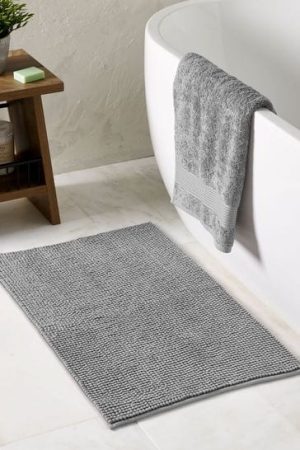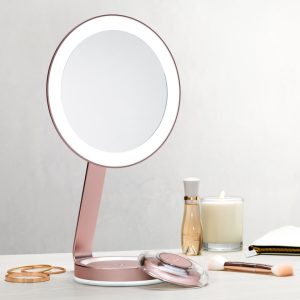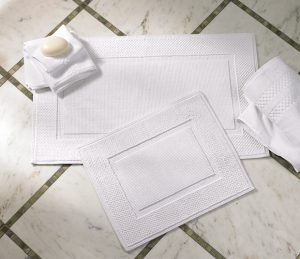
Choosing a Bath Mat
When it comes to choosing a bath mat, you want one that is absorbent, soft, durable and fits your decor. Fabric materials (especially cotton, microfiber and chenille) are often the best choice since they are easy to clean in the washing machine.
Cork bath mats are also great because they can be wiped down and aired out, avoiding the need for machine washing.
1. Bamboo
Stylish, sustainable and water-resistant, bamboo bath mats are an eco-friendly alternative to traditional woven cloth or synthetic rubber. They’re also easier to keep clean and dry than fabric, as they don’t absorb moisture or grow mildew. Bamboo also resists rot and has natural anti-bacterial properties. Many manufacturers offer bamboo mats in a range of sizes. Smaller models fit nicely in front of showers while larger ones can run the length of a bathtub.
Bamboo is a fast-growing plant that’s strong, durable and moisture resistant. It’s also a beautiful material for flooring, furniture and other decor items. Some bamboo mats are slatted with vertical or horizontal lines while others are more flexible and have lattice or woven patterns. Some bamboo mats are even crafted from recycled materials.
Some bamboo mats are made from wood that’s been pressed and kiln-dried, while others are carved to create intricate shapes and designs. Some manufacturers, like Tosaryu, use locally-harvested hinoki cypress for their bamboo mats, which is highly resistant to mold and mildew. The company also uses a mix of natural oils to protect the wood from bacteria, which reduces the need for regular washing.
As with a towel, one of the primary functions of a bath mat is to prevent slipping on wet floors. Bamboo mats help with this by letting excess water drip through the slats before it pools on the floor. Some slatted mats have a raised design that allows the water to pool underneath while flat bamboo mats part it to the side. To prevent the mat from warping or discoloring, it’s important to keep it dry. This can be done by turning it upside down after each use and allowing it to air dry.
2. Cork
Cork is another sustainable material that offers a great alternative to fabric bath mats. It’s eco-friendly because it comes from the bark of a tree and doesn’t require cutting down the whole thing, like bamboo does. It’s also a renewable resource since the bark can be harvested from the same tree again and again without damaging it. It’s a soft, warm and non-slip material that’s ideal for walking on when you get out of the shower or bathtub.
Cork bath mats can be made of natural or synthetic material, depending on your preference. Natural cork is a good choice because it repels bacteria, doesn’t absorb moisture and doesn’t develop mildew as easily as fabric mats do. It’s also water resistant and dries quickly, making it a great alternative to fabric if you want to avoid washing your mats in the machine regularly.
You can purchase a cork bath mat online, or make one yourself with this creative DIY project. It’s a fun, texturally interesting and visually appealing addition to any bathroom style, from rustic to modern. If you don’t have enough wine corks lying around, Goldune has lots of other sustainable cork products, including yoga mats, pens, desk mats and coasters.
To make a DIY cork bath mat, start by cutting all your wine corks in half lengthwise. Then, arrange them in a rectangle with their flat sides down on a piece of shelf liner or a mat cut to size. Next, apply a rectangle-shaped line of glue to the flat side of each cork and press it to the liner or mat. Repeat until the entire surface is covered and then wipe away any excess glue before it hardens.
3. Memory Foam
Turn bath time into relaxation time with a memory foam mat. Typically covered in cotton or chenille to protect the foam and add softness, these rugs feel plush underfoot while providing a nonslip surface. Bounce comfort technology helps cushion your feet while soaking up water, and embossed designs are available in colors that coordinate with most decor schemes.
Most memory foam mats have a polyurethane foam core, but some use high-density or low-resilience options to reduce the risk of bacteria and mold. Often treated with an antimicrobial agent, these mats are quick drying and help you bath mat stay cool underfoot. Conventional cotton rugs can accumulate millions of dust mites that burrow in and assemble in the loose, open spaces they create, but memory foam mats have solid cores that limit the space where these organisms can grow.
During our testing, we found that the best-performing memory foam bath mats are thick and absorbent, with a grippy rubberized backing to prevent slipping underfoot. The Yimobra Original Luxury Bath Mat earns perfect scores in both categories and features a modern geometric colorblock design that complements many bathroom designs, from traditional to contemporary. It is machine-washable and dryer-friendly, although the manufacturer recommends letting it air dry instead of putting it in the dryer to avoid warping the rubberized backing.
Plastic and rubber bath mats aren’t as absorbent as bamboo or memory foam, but they do provide a safe, quick-drying surface and can be easily cleaned with soap and water. Most of these models have a nonslip back to keep them in place underfoot and suction cups to secure them to tub or shower walls. Some are made from natural teak, which also resists moisture damage and offers a luxe look.
4. Microfiber
For a quick-drying and super soft bath mat bath mat that feels great underfoot, microfiber is the way to go. These mats often have a rubber backing to prevent slipping and are available in a range of colours and patterns.
However, it’s important to note that not all microfiber mats are created equal — low quality ones will fade and break down relatively quickly, while high-quality ones last for years. So, be sure to read reviews before making a purchase!
Wool is another sustainable option that’s super-soft and warm underfoot. These mats typically have a natural antimicrobial finish to help prevent mould and mildew growth. Additionally, they don’t need to be washed as frequently as cotton bath mats and can be hung up to dry between uses.
This is a great option for those looking to avoid synthetic materials like polyester. Cork is also a sustainable material that’s both naturally non-slip and quick-drying. Cork is also a great choice for those with sensitive skin, as it doesn’t absorb water or hold odors.
This is a great option for those who prefer a traditional bath mat with a little extra padding underfoot. It’s a plush, tufted, 100 percent cotton mat that’s stain-resistant and machine-washable. However, it’s not as fast-drying as some of the other options we tested and may shed lint during washing. Still, it’s a great value at $30 to $50. And, the company’s eco-friendly manufacturing practices make this a truly standout option.
5. Cotton
Cotton bath mats are one of the most common types available. They’re typically soft underfoot, quick-drying, and available in a wide range of colors and sizes to suit any bathroom decor. When shopping for a cotton bath mat, look for one with high-quality fibers to ensure it lasts and holds up well.
In our tests, this 100 percent cotton bath rug from The Company Store impressed us with its plush texture and exceptional absorbency. It also has a thick looped construction that feels durable and looks great. The only drawback is that it’s not as quick to dry as some of the other materials we’ve tested.
A microfiber bath mat is another excellent option for those who want something quick-drying and soft underfoot. This material, which can be made of either nylon or polyester, can withstand frequent use and resist fading or shrinking. However, it’s important to note that the quality of a microfiber bath mat can vary significantly from manufacturer to manufacturer and even between models within the same line.
Lastly, we recommend looking for a cork or wood bath mat that is actually made of real cork and not some synthetic product. These models will be able to withstand a lot of wear and tear, are quick to dry, and have a natural anti-fungal property.
Cloth bath mats, on the other hand, are a breeding ground for bacteria and viruses. Because they’re often in the dampest part of the home, they’re a perfect place for mold and mildew to grow. They’re also hard to clean thoroughly and often fall apart when machine washed. If you do choose a cloth bath mat, make sure to wash it regularly and to hang it up to dry completely to prevent the growth of bacteria.



